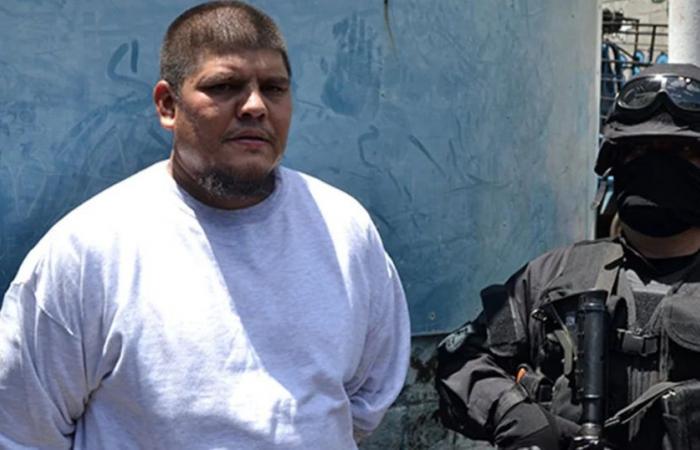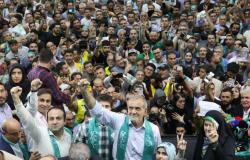
The last of the gang leaders who has been detained by US agents is called César Humberto López Larios, alias “Stoners Greñas” and one of the historical leaders of the gang MS13. The capture of Greñas has something in common with that of other Salvadoran gang leaders: they occurred in the United States after the government of the Salvadoran president Nayib Bukele illegally released them from prisons in the Central American country.
López Larios had been released from the Salvadoran prison where he was in 2020, a year after Bukele assumed the presidency, according to a leak of police data that was later revealed by several journalists. Previously, this gang leader had temporarily left prison on at least two occasions thanks to special permits granted to him by the General Directorate of Penal Centers (DGCP), led by Osiris Moonan official close to Bukele accused of corruption and for managing a governance pact with the MS13 and the Neighborhood 18the other gang in the country.
López Larios was detained at the airport in HoustonTexas, on June 11, according to the Eastern District Attorney’s Office. NYwhere the Salvadoran gang member was sent to answer for acts of terrorism in a case opened in that New York jurisdiction in 2020.
Before “Greñas” two other gang leaders involved in the terrorism case were arrested in the United States: Elmer Canales Riveraalias Crook, and Fredy Iván Jandres Parada, aka Lucky from Parkview. The three gang members occupied, at some point in this century, leadership positions in the national ranfla, which is how the group that has directed the activities of the MS13 is known in Salvadoran criminal jargon.
Like Crook, Greñas was first arrested in Mexicofrom where the Mexican authorities began administrative deportation processes to El Salvador, but in both cases the Mexicans sent the detainees with a stopover in Houston, where the US authorities were waiting to detain them and then extradite them from Texas to New York.
A former US federal official, who was informed of the terrorism case against Salvadoran gang members, confirmed to Infobae that the arrival in Houston was agreed in advance with the Mexican counterparts to prevent the final destination of the detainees from being El Salvador, where the leaders of the MS13 have already benefited from the Bukele government.
Greñas, Crook and Lucky, the three gang members who are already at the disposal of the US authorities, were arrested by federal agents who worked in coordination with their colleagues from the Vulcan Task Forcea special unit populated by agents of the Federal Bureau of Investigation (FBI) and the Anti-Drug Agency (DEA), which was formed at the end of 2019 to initially investigate the national leaders of the MS13 in El Salvador and the United States.
Very soon, after the start of his investigations, Vulcano accumulated suspicions that the government of the recently sworn-in President Nayib Bukele had an agreement with the gang leaders imprisoned in El Salvador at that time, among whom at that time still included the three who are now They are on American soil.
The Salvadoran prosecutor’s office, then led by an official whom Bukele did not fully control, joined forces with the Americans to delve deeper into the investigation. The case was left in the hands of Special Group against Impunity (GECI), a special unit created to investigate major cases of corruption and the possible gang pact.
During the confinement due to the Covid-19 pandemic, and even a little before, the GECI, based on information from prison sources and police intelligence, discovered that Bukele officials were involved in shaping an agreement with the leaders of the MS13 and Barrio 18 by orders of President Bukele. Prosecutors, with court orders, tapped phones and followed up on officials; They identified two as the most relevant in the negotiation of the pact: Osiris Luna Mezathe director of prisons, and Carlos Marroquina presidential secretary who had already promoted rapprochements with the gangs when Bukele was mayor of San Salvador between 2015 and 2018.
The Americans at Vulcano, in collaboration with Salvadoran prosecutors, supported the investigation from Washington and New York, but above all from their headquarters in Miami. After the pandemic, and convinced that the gang pact involved the highest officials of the government Bukele, Vulcano and Eastern District Attorneys of New York prepared an accusatory file against Marroquín and Luna Meza, as revealed at the time by the Reuters agency.
In essence, what US agents and Salvadoran GECI prosecutors had discovered was that Marroquín and Luna had negotiated with gang leaders “on behalf of the president” an agreement that would give MS13 leaders flexibility in prisons, benefits economic rights, control of their territories and would protect them from eventual extradition to the United States in exchange for them stopping killing each other in the streets and that would support governance of Bukele.
Vulcano carried out its investigations, during much of the pandemic, in strict confidentiality and, according to a former Biden administration official who spoke with Infobae from anonymity, he protected the information of the officials of the Department of State those in charge of diplomatic management in the relationship with El Salvador. “It is normal, many of these investigations DOJ (Department of Justice) carries out in silence, to protect them from possible political influences,” said the source.
The truth is that, when the last days of the administration of donald trump In Washington, in San Salvador, information that the investigation by the local prosecutor’s office and Vulcano agents was approaching Bukele officials had been leaked to Presidential House. Bukele, as confirmed to Infobae by a former official and two US government contractors who were closely familiar with the Vulcano investigations, made a political effort with the then US ambassador, former CIA agent Ronald Johnson, to stop the investigations. The Salvadoran president was successful and the possibility of criminal prosecution of Luna and Marroquín in the United States was stopped. The pact remained in force.
It seems a contradiction: the main achievement that Salvadoran voters and some governments and international media recognize Nayib Bukele is, precisely, the reduction of gang violence and the recovery of state control in territories previously dominated by the MS13 and Barrio 18 when, at the same time, the details about their pact with the big bosses of both criminal organizations are increasingly public.
The truth is that the downward trend in homicide figures, which had started in El Salvador in 2015, four years before Bukele, was accentuated with his arrival to the presidency and that, after the consolidation of the pact and the entry into validity of the emergency regime in March 2022, after a partial breakdown of the gang agreement, downward trends have continued. Also, judging by the benefits granted to the historical leaders of the MS13, the pact, at least with them, was maintained.
TO César Humberto López Larios The Salvadoran justice had sentenced him to 163 years in prison in August 2019 for his participation in 10 homicides, for leading a terrorist organization and for bribing officials. However, by October 2020, when Bukele was already president and Osiris Luna the head of prisons, the gang leader was released. A similar path was taken by Élmer Canales Rivera, the Crook, another of the MS13 leaders imprisoned in New York.
In the case of Crook, the Bukele government’s intervention was more direct. It was Carlos Marroquín, the other Bukele official whom US prosecutors were about to charge with criminal charges, who broke him out of jail, gave him a gun and took him to Guatemala, from where the gang member fled to Mexico. In the Mexican capital, thanks to the collaboration of the Vulcano Force and federal agents of that country, Crook was arrested in November 2023; Earlier, a Bukele official had tried to hatch a plan to take him back to El Salvador.
The United States has accused Canales Rivera, López Larios and the majority of the other dozen gang leaders whom New York prosecutors are claiming for acts of terrorism as being members of the MS13 board of directors who, among others, things, he planned the expansion of the Salvadoran ganghe directed murders and extortions in El Salvador, allied himself with Mexican drug traffickers and, in addition, made pacts and engaged in political dialogues with four Salvadoran governments since 2004, including Bukele’s.
This board of directors, the ranfla as it is known, is defined by the US justice system as follows: “The national ranfla… sent its top leaders to organize operations, establish contacts and obtain drugs and weapons from Mexican cartels such as Los Zeta, the Gulf Posterhe Jalisco New Generation Cartel and the Sinaloa Cartel…to become involved in human trafficking and smuggling. The national ranfla also directed MS13 members in the United States to engage in criminal activities such as drug trafficking and extortion to finance the gang’s terrorist activities in El Salvador and elsewhere.”
US prosecutors also say that since 2012 the leaders who were let go by Nayib Bukele’s government “negotiated with officials of the El Salvador government to obtain benefits and concessions.”
Of the 14 leaders of the national MS13 gang accused in New York of acts of terrorism, three are detained and have been ordered by a court in the eastern district of that city. The other eleven are considered by US prosecutors escapees despite the fact that the Bukele government, in private conversations and through official communication, has assured that several of them are in custody in El Salvador.
The Salvadoran president, in fact, does not like to talk too much about the pact with the leaders of the MS13, about the benefits that his head of prisons has extended to some of them or that the current attorney general and the Supreme Court of Justice, to those that the president controls have shielded several of those extradition bosses.
If Bukele talks about others who refuse to extradite gang members. In an interview earlier this month with the American Tucker Carlson, Bukele attacked the Spanish justice system for refusing to extradite a member of the MS13. “Is a satanic gang“said the Salvadoran indignantly. Bukele and Carlson said nothing about the comings and goings of Crook, Greñas or Lucky, the leaders of the MS13 with whom the president and his officials negotiated; They said nothing about all the times that the attorney general of El Salvador, Rodolfo Delgadoand the Supreme Court justices have prevented the leaders of the “satanic gang” from being held accountable for acts of terrorism in the United States.





